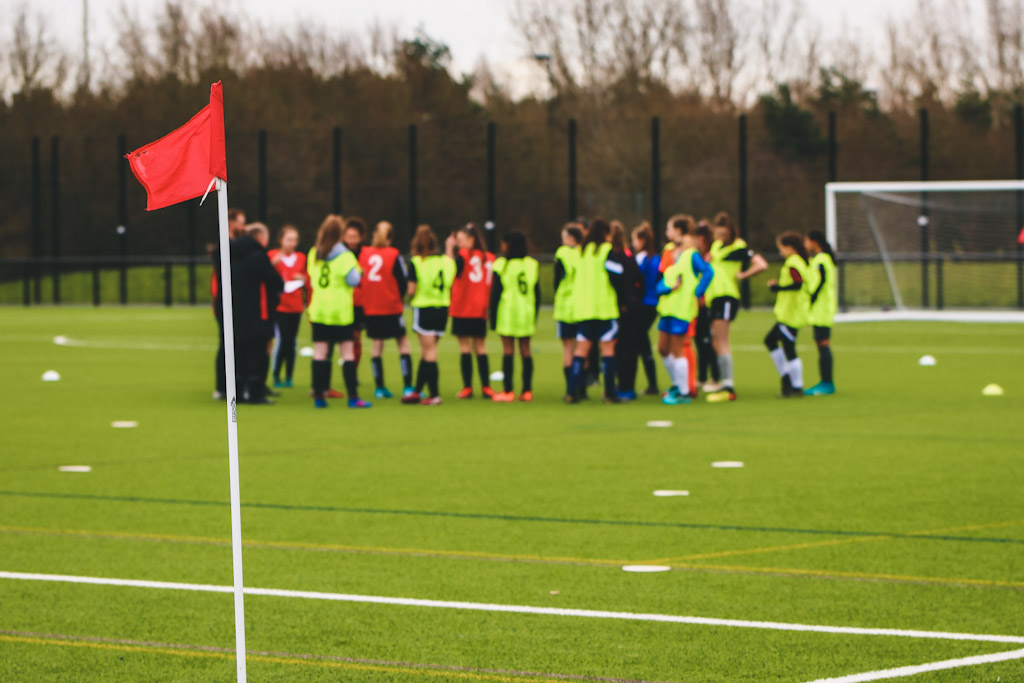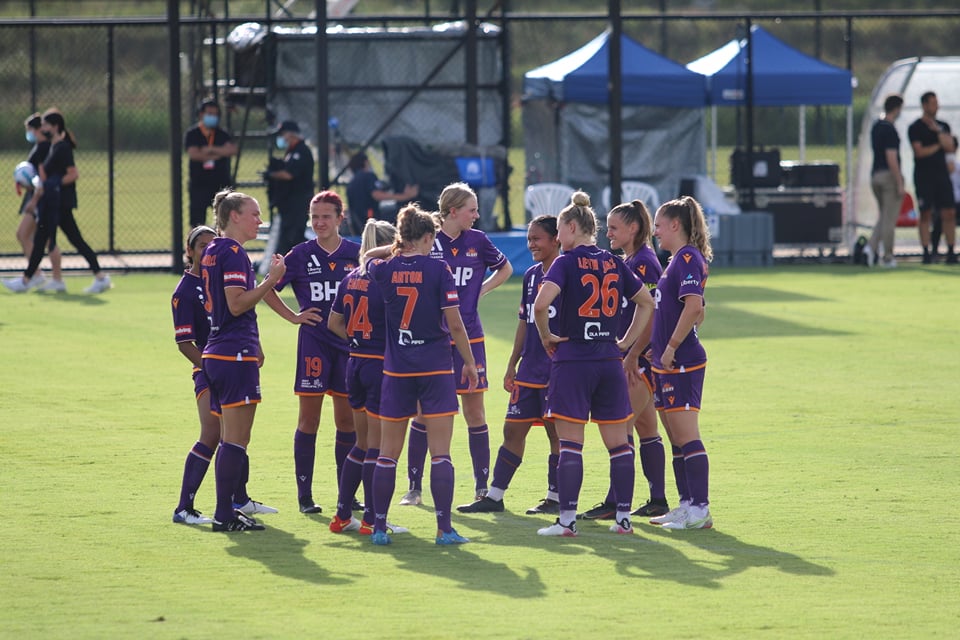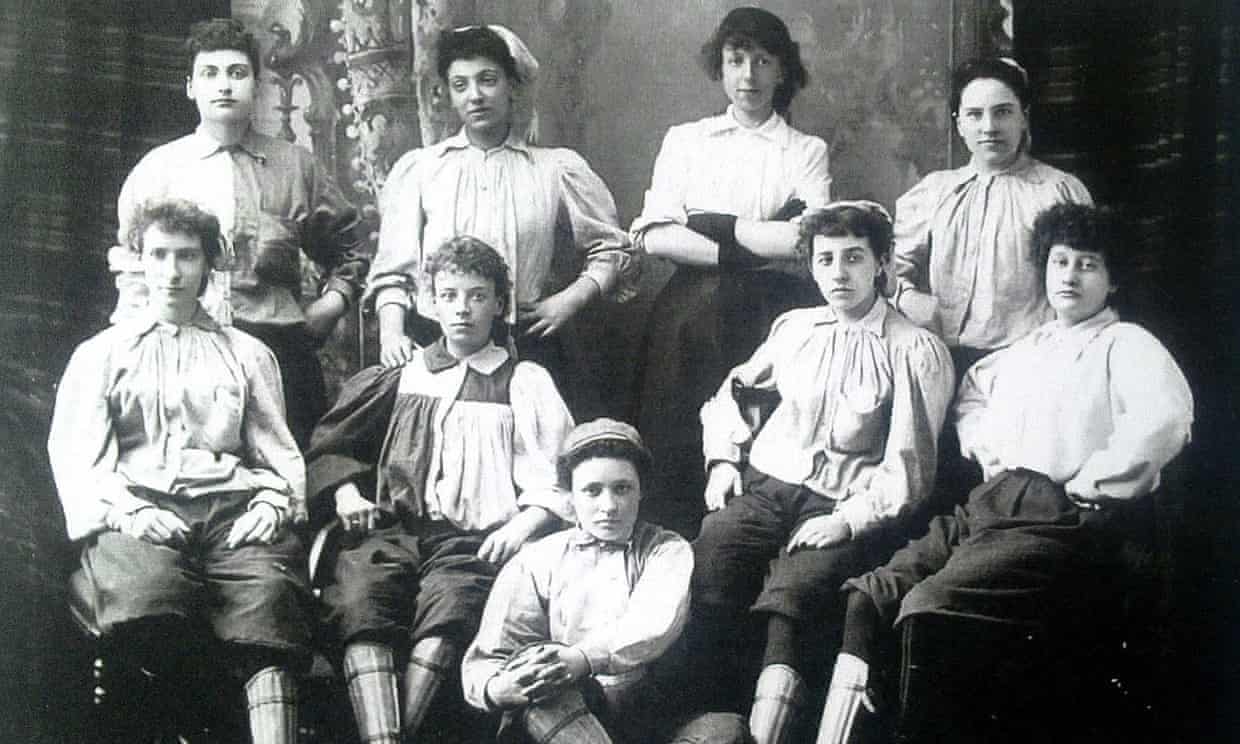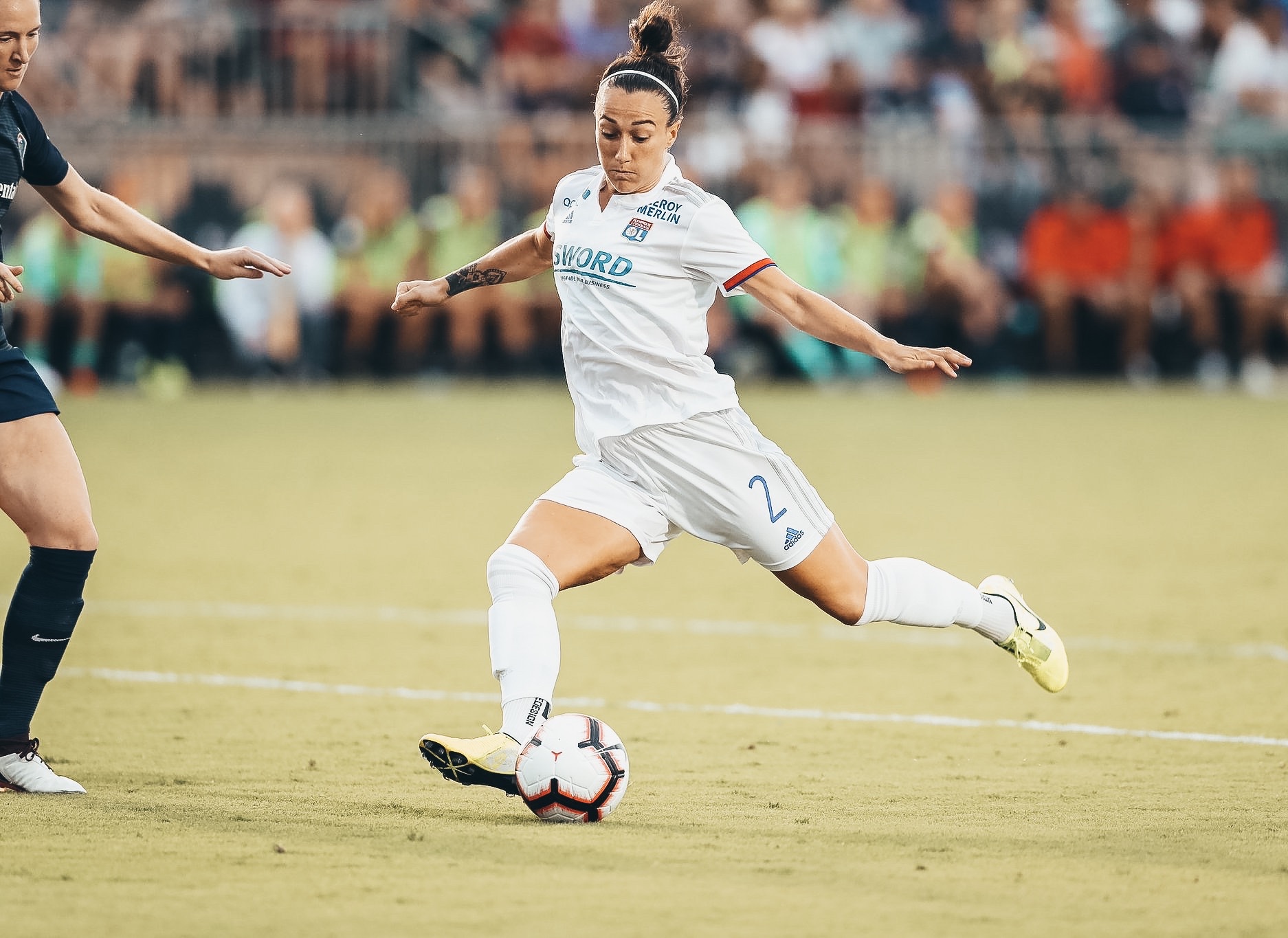Six minutes.
That’s how close the Lionesses were on Wednesday to suffering a disaster.
Make no mistake, if England had lost to Spain and gone out of their home European Championships at the quarter-final stage, it would have been a hammer blow not just to the squad, but to the game of women’s football in the UK.
The bigots, naysayers and critics we still regrettably see under every single post related to women’s football in these championships were already salivating at the prospect of an early England exit to validate every prejudice they’d ever had. Media folk like Simon Jordan (who has weirdly been allowed to be caustic and run down the standard of women’s football these Euros despite working for one of the official UK tournament broadcasters and self-claimed “champions of women’s football” in Talksport) were preparing for a field day of concern-trolling, fake sympathy and mockery. Football Lads all over Twitter couldn’t wait to post their “no-one cares” posts more gleefully than ever under announcements of England’s loss. All the “shoving it down our throats” complaints were ready, all the “now that’s over, we can get on with the REAL football” sarcasm was locked and loaded.
And the problem was, that that attitude might have been reflected in the broadcasters and more importantly, the viewing numbers, which on Wednesday night had begun to come close to the heights of the so-far record for a Lionesses game of 11 million for the semi-final of the 2019 World Cup (another game that England lost, and we’ve seen how viewing figures for the Lionesses have took time to rebuild since). It would certainly have been reflected in the loss of potential interest in the domestic season, which starts in less than a month.
That apathy, which some still seem proud of sharing even with the Lionesses’ efforts this tournament, the continuing weirdness of big sports media outlets sharing male football fans saying things like “imagine if England had been in a major tournament this summer – what fun it would have been” even as they were would have continued to become the norm, and without the Lionesses to hook in the crowds, viewing figures would likely have dropped like a stone for the BBC’s coverage and possibly caused some at the corporation to question whether women’s football was really worth the “full treatment” that it has been given for the first time this Euros in terms of game broadcasts and pundity.
This tournament and its increase in media coverage and visibility has not been without its downsides, though. It started before the tournament when UEFA and the tournament organisers realised that they had WOEFULLY underestimated the coverage of the tournament in the size of venues and press facilities – there simply wasn’t room at many of the stadiums to get all the press who asked for accreditation in, and many longstanding champions of the women’s game lost out on covering some games as a result.
Then, of course, the likes of Sky and BBC’s coverage had some teething troubles as the tournament began, seeming at times to be in transition from the old “token” coverage of women’s football to the brave new world we’re currently seeing. Jonathan Pearce commentated on several games where he appeared to be doing some sort of mumble-rap act talking about anything BUT the game, which is disappointing, especially from someone who has been involved with women’s football coverage for ten years or more. It seemed at times almost that he was put out at not being given the England games.
That decision has been proved to be a good one, though, due to the BBC’s fantastic decision to give Robyn Cowen the lead commentary – she has been passionate, knowledgeable and her commentary of England’s games has a chance to become iconic. Pien Meulensteen and Vicki Sparks, too, have absolutely shone in their broadcasts, with easy relationships with co-commentators and the sheer joy of what they were witnessing coming through.
From Alex Scott, Gabby Yorath and Reshmin Chowdhury’s presentation of broadcasts to the incredible depth and range of discussions presented by names like Izzy Christiansen, Fara Williams, Kelly Smith and non-English voices like Anouk Hoogendijk, Vicky Losada, Megan Bell and Laura Georges, the depth and knowledge of the female football community has truly blazed brightly. The male pundits, too, have treated the games with the respect and love it deserves and Ian Wright, Jonas Eidevall, Scott Booth and Jon-Arne Riise to name just a few have all, in their own way, added massively to broadcasts with their knowledge, passion and eloquence while being comfortable and confident enough to allow these women the forefront while being far from the “token men” dinosaurs like Alan Sugar have complained about in an attempt to drive division.
And sadly, there have been many, many attempts to either sabotage, play down or ridicule both the tournament itself and the efforts of the women bringing it to us. Culture wars, as we feared, have been dragged into the Women’s Euros time and time again, whether it be the idiotic abuse Eilidh Barbour and Alex Scott have received when attempting to discuss diversity in the women’s game, claims that gender equality has gone too far (you can see those in every comment about the women’s sport being “shoved down people’s throats” – and these things being added to just the standard plan of attack the anti-women’s football crowd run in parallel of denigrating the standard under every highlight or great goal. If not that, we’ve had “laddy” football accounts like Sportbible seemingly forget the women’s Euros exist by responding to warm weather by wishing “England were in action at the World Cup” this summer for the fun it’d be rather than actually acknowledging the England team in a major tournament right now.
Even the sterling work of writers like Kathryn Batte in the Mail and Tom Garry in the Telegraph has had a large proportion of these trolls underneath their efforts – you couldn’t blame women’s football writers in the mainstream media for feeling frustrated as their hours of work and carefully-crafted, insightful articles attempting to promote the joy of the women’s game often still receive nothing but viciously negative and often misogynistic comments “below the line” as a section of readers unleash their vitriol every chance they get.
We’ve also seen instances of the media actively shoot themselves in the foot (for example both the Guardian AND FourFourTwo posting the pictures of the “wrong” player of colour in their much trumpeted and flashy previews, or in the Guardian’s case writing a baffling “guide to the tournament” that focused more on gossip and who the players were dating than anything that football fans might actually want to read – or even worse seemingly to try to sabotage their own coverage.
Sabotage their own coverage?! At least that’s the only conclusion one can draw from Talksport, for example, who trumpet their coverage of the women’s Euros and live commentary while simultaneously allowing failed football-club owner and rent-a-gob Simon Jordan to denigrate the standard of the women’s game for “engagement” almost daily on their flagship talkshow and his own widely followed Twitter account.
But perhaps the most egregious example of that comes from the Telegraph this week – and it pains me to single them out as in Tom Garry they have one of the hardest-working and most thoughtful scribes of women’s sport in the business. This summer, though, in expanding their coverage they’ve added Northern football writer Luke Edwards…and after several confusing headlines (for example claiming England dropping Ellen White was “unthinkable” when the White-Russo debate had been running for WEEKS) yesterday he managed to come up with a headline so obvious in its bait for mockery by the anti-women’s football crowd it almost seemed quoted on purpose. To see the issue – here is the headline Edwards or his editors at the Telegraph went with compared to other outlets.
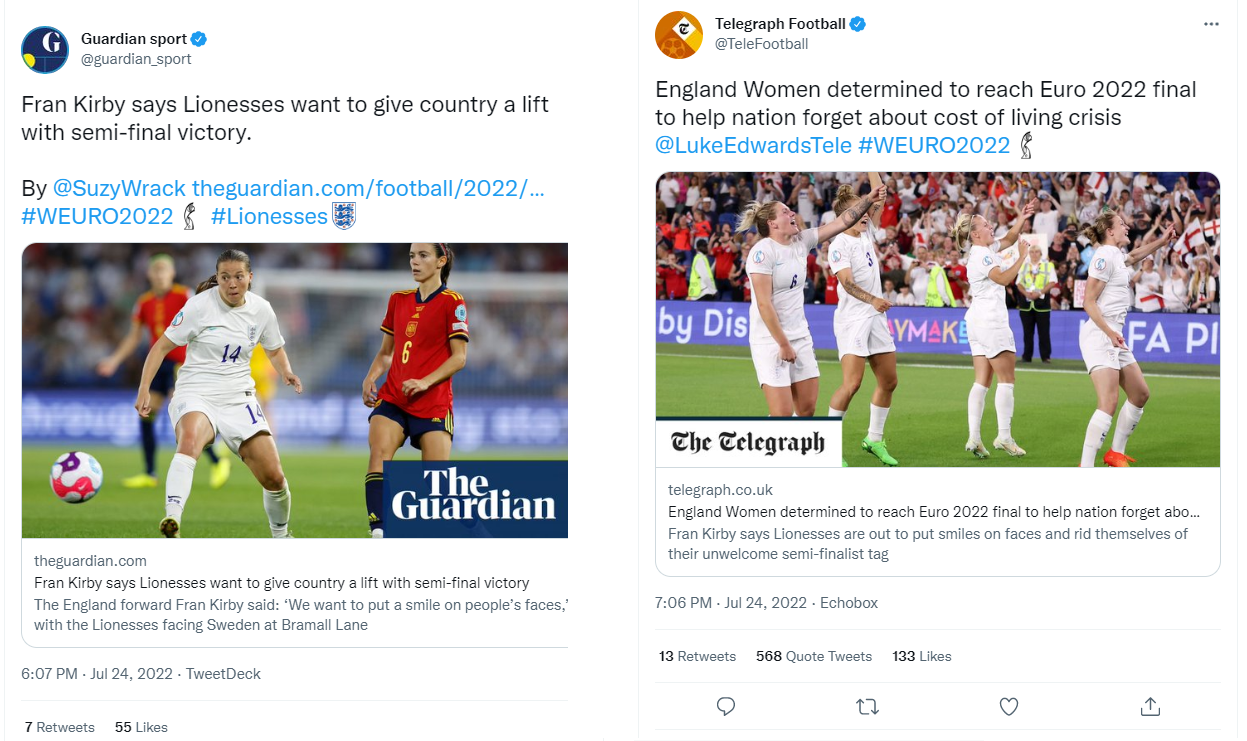
You can see the differences in interaction between these two headlines, which use EXACTLY the same quote from Fran Kirby as their base. However, the one on the right, Edwards’ piece for the Telegraph, with over 500 quote tweets, is overwhelmingly receiving negative reaction because of the headline, which by presenting the Lionesses as thinking they can help the nation “forget” the very real economic problems millions in the UK are facing right now, is red meat for anti-women’s football folk to seize upon and at best mock with tweets like “Oh, my kids are starving but they’re OK cause Alessia Russo just scored a header” and at worse insult and abuse both Kirby and her fellow Lionesses. And the key thing is – Edwards or his sub-editor probably knew there was a risk of that reaction – they knew exactly who they were feeding with that headline. And yet they wrote it anyway, not only putting massive pressure on the Lionesses to succeed but also leaving them open to the kind of vicious mockery that it has attracted.
And this is the thing. As women’s football has grown throughout this tournament, it’s attracted the worst kind of media – the clickbait, outrage-interaction-driven headlines meant to divide and cause arguments rather than simply get the point across. We’ve seen people who’ve perhaps never written or discussed the game before using it to push toxic viewpoints or worse, we’ve seen the extreme elements of society I talked about in this piece double down and come to the forefront.
The feats of the Lionesses and their fellow international teams this summer have brought women’s football once again to a wider audience. And as England stands on the verge of a home Euros final and possibly a seismic point for growth in the game in this country, media needs to be aware how fragile that growth and approval is, how many challenges it still faces, and how easily they can destroy all the momentum while putting extra pressure on a group of English women who have spoken all along about how they know the hopes of millions and possibly the entire women’s game in the UK is currently riding on them.
Put simply, women’s football is now in a position where, whilst there are more and more fantastic voices of all genders doing incredible work to promote the game in both national media and fan blogs and websites to a higher level than ever before – voices like Suzy Wrack in the Guardian and the aforementioned Kathryn Batte and Tom Garry in their respective papers, Emma Sanders at the BBC, and others who are making themselves vital and valued mainstream voices in the game. But women’s football is perhaps more precarious than men’s in that there are many, many vultures circling and chomping at the bit to knock it down – out of fear of competition to “their” men’s game, outright misogyny or just idiocy, and this week the media need more than ever to be aware of whether they choose to share the positivity and joy of the tournament and feed the growth of the women’s game, or feed the vultures just waiting to knock it back down again. Because their choices now, irrespective of England’s results this week, will echo long after Euro 2022 is over.






